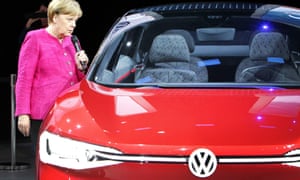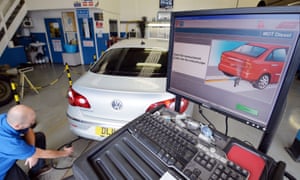VW condemned for testing diesel fumes on humans and monkeys
Experiments involved monkeys and humans breathing in exhaust fumes for hours at a time

The German chancellor, Angela Merkel, said VW’s diesel experiments on humans and monkeys were ‘not ethically justifiable in any shape or form’.
Photograph: Daniel Roland/AFP/Getty Images
Volkswagen, the world’s biggest carmaker, is under fire globally from politicians and environmentalists following revelations it commissioned experiments in which monkeys and humans breathed in car fumes for hours at a time.
Angela Merkel, the German chancellor, said there was an urgent need for the company to reveal the true extent of the experiments. “These tests on monkeys or even on humans are not ethically justifiable in any shape or form,” her spokesman, Steffen Seibert, said on Monday. “The indignation of many people is absolutely understandable.”
VW is already under heavy scrutiny over its role in the “dieselgate” scandal, in which the carmaker manipulated tests on about 11m cars worldwide to make it appear they met air emissions tests, when in reality they exceeded them many times over when used on the road.
The company said on Monday a small internal group had mistakenly pushed for the tests to be carried out and that they did not reflect VW’s ethos. But industry observers said VW’s excuses held little water, as the experiments had been well-documented and the results presented to managers at BMW, Daimler and VW, all of whom belong to the car lobby institute, the European Research Group of Environment and Health in the Transport Sector (EUGT).
VW’s supervisory board representative and chief controller, Hans Dieter Pötsch, said on Monday he was struggling to understand how the tests had been allowed to be carried out, calling them “in no way understandable”.
Daimler and BMW tried to distance themselves from the tests, stressing that none of their cars had been used in the experiments.
Initially reported in the New York Times, the tests, carried out in May 2015 by the New Mexico-based Lovelace Respiratory Research Institute (LRRI), involved locking 10 Java monkeys in small airtight chambers for four hours at a time. The animals were left to watch cartoons as they breathed in diesel fumes from a VW Beetle. The ultimate aim of the tests was to prove that the pollutant load of nitrogen oxide car emissions from diesel motors had measurably decreased, thanks to modern cleaning technology.
In a second round of tests, the animals were forced to breathe in the fumes of a Ford F-250 used for the purposes of comparison, because the car was an older model with apparently less sophisticated filter technology.
According to some reports in the Süddeutsche Zeitung and the broadcaster NDR, the monkeys were subsequently anaesthetised and intubated, so their blood could be examined for inflammatory markers. Their lungs were then washed out and their bronchial tubes examined.
According to the LRRI, the Java monkey species was chosen by the EUGT itself.
The Süddeutsche Zeitung reported the experiments were also carried out on 25 young and healthy human beings.
According to the Stuttgarter Zeitung, the experiments were carried out at an institute of the University Clinic Aachen and involved the group having to breath in varying different concentrations of nitric oxide after which they were physically examined for any side-effects.

A Volkswagen Passat CC car is tested for its exhaust emissions at an MOT testing station in London. Photograph: John Stillwell/PA
Revelations about the tests have only served to deepen suspicions that the industry is looking to increase the acceptance of diesel as a clean source of energy even as increasing numbers of scientific studies show the opposite to be the case.
LRRI said it decided to withdraw from the EUGT-commissioned study in the autumn of 2015 following the emergence of the dieselgate scandal. “After we learned about this fraud, we decided that the study was flawed,” the LRRI’s president Robert Rubin told a German newspaper.
Barbara Hendricks, the German environment minister, said what was known about the tests so far was “vile”.
“That a whole branch of industry has apparently tried to discard scientific facts with such brazen and dubious methods makes the entire thing even more horrific,” she said. Those responsible, she added “have not understood what is on the agenda here – to finally accept full responsibility in the diesel scandal”. She said she was “appalled” that scientists had “made themselves available as willing supporters of such despicable experiments”.